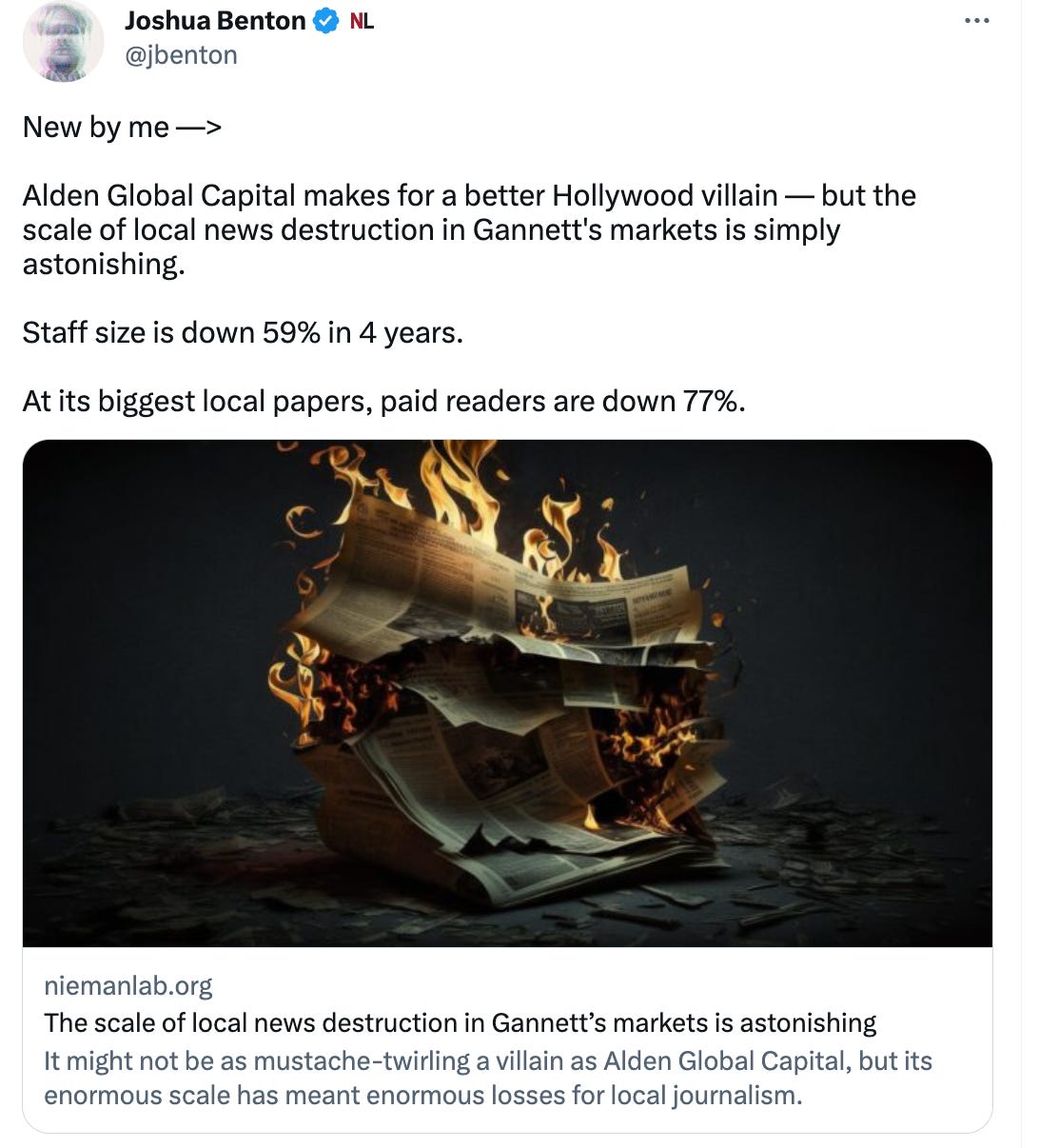Billionaires Are Strangling Local News to Death
Community-based media is being slowly but surely murdered by a few giant companies.
Local news has famously been in a sorry state of decline, crisis, and catastrophe for decades. Newspaper newsroom employees have dropped 57 percent since 2004. Thousands of newspapers have shut down at a rate of about two a week, according to one study. As of last year, research suggests that a fifth of the U.S. population lives in a news desert, or in a community that’s on its way to becoming one.
It’s honestly pretty bleak, and the state of your own local news ecosystem is probably enough to convince you of that. It’s not just a loss of invaluable coverage, regional identity, and specific service journalism. The quiet murder of this once-booming business encapsulates an existential panic that goes about as far as you want to take it: The decline in local news outlets is bad for communities, bad for American politics, bad for civic engagement, and exacerbates socioeconomic divisions. Poverty rates are higher in news deserts, which are a source of countless problems like decreased voter participation, increased corruption, and lagging trust in both the media and democracy itself. What’s more, a startling number of people actually don’t even know this crisis is happening.
Aw yeah baby, let’s absolutely spin out over this. It’s an emergency for journalism and for our democracy!!
OK, it’s not all bad news and it’s not completely hopeless. Emerging digital outlets, public radio, and student journalism have offset the calamity to some degree. To be crystal clear, those are not super-encouraging bandaids on any level (sorry! lol), but they are something. The upheaval of the industry has somehow been both a fast and slow car crash. It’s fucked, but there have been small opportunities for adaptation and survival. People are still doing good work, but at a dwarfed and desperate scale, all while cable news blares in the background and a graveyard of fallen outlets recedes further and further from collective memory.
In some ways, the collapse was a death by a thousand cuts—happening over time with small crises amid a bigger storm—and in another sense it was a simple, one-two punch: the rise of the internet and loss of ad revenue rendered the newspaper business unsustainable for all but a tiny few titles. But there’s another clear, reliable enemy in this tragedy, one that hides under the guise of victim: the bosses and companies who have failed at every turn to change the story—or, more accurately, have actively gutted the papers, the workforce behind them, and the vital service they provide.
This crime has mostly been committed by a few behemoths. Gannett, Lee Enterprises, and Alden Global Capital (a hedge fund) are the largest news chains in the country, and together, they own the majority of dailies in the U.S. (As with every other facet of life in this country, billionaires are a huge problem—perhaps the problem—in the U.S. news business.) There has been an uptick in buying over the last few years by smaller, privately held media companies as these conglomerates are selling papers back and doing their combination murder/Homer backing into the bushes dance, but for the most part, these three companies are in charge. They’re the adults in the room.
All this is well-trodden territory, particularly for someone like me whose livelihood depends on the overall health of the news business, large and small, in print and online. And even I am not desensitized enough to ignore the shitshow that’s currently going down at Gannett, which seems to be determined to single-handedly perform a kill shot on its own industry.
Gannett has been at the news game for a long time, and at the news-destroying game for roughly just as long. I know because my own local paper from my hometown (which once employed my father) has been ravaged under its stewardship. But the decimation of Gannett’s papers increased dramatically since 2019, when the company merged with GateHouse Media. It’s been a brutal three-plus years, with massive cuts in both employees and papers.
I won’t rehash every gory detail, but here’s what has gone down just in the last 10 months or so: After a grim earnings report last year, Gannett did a round of layoffs and then another round and then another round, and they implemented other cost-cutting measures, all while CEO Mike Reed takes home nearly $8 million annually. They’re consolidating and shrinking at a scale and pace that’s alarming, even in a landscape that’s been in a state of downsizing for years. Even the execs are jumping ship.
Nieman Lab reporter Joshua Benton probably put it best:
Benton’s extensive reporting is worth reading in full. He writes that “no company has done more to shrink local journalism than it has in recent years.” He also gets at something that has always bothered me when it comes to the conversation around the failing health of newspapers—who’s at fault. It’s one of many large-scale modern problems (like climate change) that gets framed as an issue of negligence on a personal scale. If people were willing to recycle their plastic bottles or pay more for journalism, it would solve the respective problems. The responsibility lies with the collective. Sure, there’s some small amount of sane and rational thought happening there. These are, after all, quite complex issues! But also, respectfully, that’s a lot of bullshit.
Here’s what Benton writes about the widespread decline in circulation revenue: “You can debate the direction of causation: how much the cuts were driven by declining revenues, versus how much the declining revenues were driven by the cuts. But the end result is the same either way—a newspaper that is, today, an embarrassing product.”
The embarrassment isn’t because of the journalists who want to do the work or the news consumers who want to read it. It’s because of capitalism, predatory and stupid owners, unregulated big tech, and generally speaking, a set of much larger evils that are not the fault of ordinary people who by all accounts, once enjoyed knowing what was happening in their local governments and schools, and what jobs were available, and who died. The world of information has changed dramatically in the last few decades, but peoples’ basic informational needs have not. The failures of local media and digital media are the result of unforced errors, C-suite stupidity, and ruthless capital-B Business Decisions made by people who don't know the first thing about the business they're in.
The problems at the heart of the demise of local news are also at the heart of what’s killing quality digital media, which has undergone an absolutely horrific couple of months. BuzzFeed News and MTV News were killed off, and countless other outlets have faced savage cuts, which in varying degrees can all undoubtedly be traced to a single source: stupid, greedy managers with too much power and insatiable, mindless greed.
Perhaps the most emblematic case of this in recent memory is Vice (full disclosure, my former employer!), which the New York Times literally called it a “Decayed Digital Colossus” after the company filed for bankruptcy earlier this week. There’s a lot going on with the collapse of Vice, but it’s a media organization that, much like Gannett, has ravaged its own newsroom with stunning frequency in the last few years. And much like Gannett, the actual journalism is not the problem. Now and forever, the content model for news works, but the business model often does not. There was a time when it seemed like digital media could be the next generation of news, but it won’t ever happen if the business model and the minds behind it, still suck. In an exercise of perfect capitalist nightmare poetry, the journalists at Vice are doing the best reporting out there on the disintegration of their own company.
All of this is infuriating, but it’s also deeply sad and disheartening in an existential, personal, and societal sense. The Los Angeles Times recently reported on the slow death of the local paper in Salinas, California, which just lost its last reporter. It’s another piece that’s worth reading if you really want to sit with exactly how these once-thriving papers have been slowly and effectively destroyed:
Owned by the largest newspaper publisher in the nation, Gannett, the venerable Californian now carries stories from the chain’s USA Today flagship and its other California papers. The only original content from Salinas comes in the form of paid obituaries, making death virtually the only sign of life at an institution once considered a must-read by many Salinans.
The Salinas Californian follows in the footsteps of other Gannett-owned papers that have suffered, floundered, and/or disappeared under the company’s management. It’s an outrage that is so familiar at this point that it runs the risk of dulling and becoming boring. Years of hand-waving and hair-pulling and watching things declining make it all seem inevitable, but that’s far from true. It's heartbreaking and enraging to watch the vultures of business destroy such integral pieces of communities across the country. Maybe if we stopped shrugging our shoulders or blaming “the internet” we’d feel more emboldened to recognize that a reality could exist where we get that infrastructure back. Gannett and its peers are in the business of wrecking hyper-local (and digital) outlets and the coverage they provide. They are incompetent, they are menaces, and they are villains, and we should never let them forget it.





News. What news. It's all infotainment. And the public are lapping it up. With the internet news and its many petputations should be at your fingertips yet folks set and listen and believe MSM bull shit.